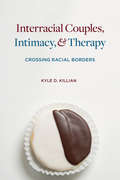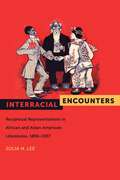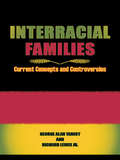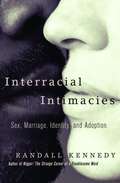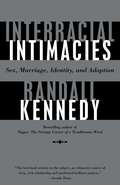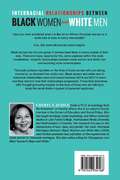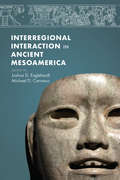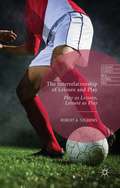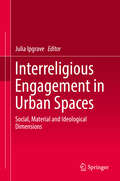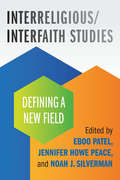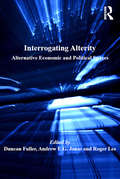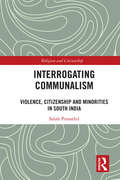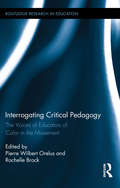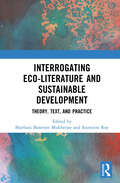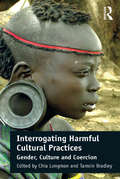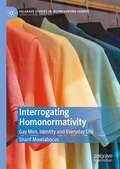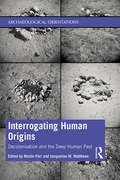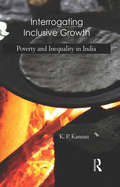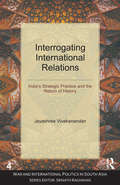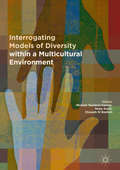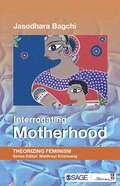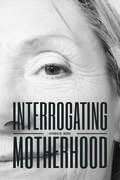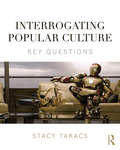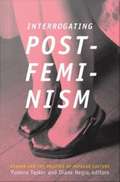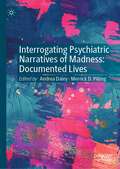- Table View
- List View
Interracial Couples, Intimacy, and Therapy
by Kyle D. KillianGrounded in the personal narratives of twenty interracial couples with multiracial children, this volume uniquely explores interracial couples' encounters with racism and discrimination, partner difference, family identity, and counseling and therapy. It intimately portrays how race, class, and gender shape relationship dynamics and a partner's sense of belonging. Assessment tools and intervention techniques help professionals and scholars work effectively with multiracial families as they negotiate difference, resist familial and societal disapproval, and strive for increased intimacy. The book concludes with a discussion of interracial couples in cinema and literature, the sensationalization of multiracial relations in mass media, and how to further liberalize partner selection across racial borders.
Interracial Encounters: Reciprocal Representations in African and Asian American Literatures, 1896-1937 (American Literatures Initiative #2)
by Julia H. Lee2013 Honorable Mention, Asian American Studies Association's prize in Literary Studies Part of the American Literatures Initiative Series Why do black characters appear so frequently in Asian American literary works and Asian characters appear in African American literary works in the early twentieth century? Interracial Encounters attempts to answer this rather straightforward literary question, arguing that scenes depicting Black-Asian interactions, relationships, and conflicts capture the constitution of African American and Asian American identities as each group struggled to negotiate the racially exclusionary nature of American identity. In this nuanced study, Julia H. Lee argues that the diversity and ambiguity that characterize these textual moments radically undermine the popular notion that the history of Afro-Asian relations can be reduced to a monolithic, media-friendly narrative, whether of cooperation or antagonism. Drawing on works by Charles Chesnutt, Wu Tingfang, Edith and Winnifred Eaton, Nella Larsen, W.E.B. Du Bois, and Younghill Kang, Interracial Encounters foregrounds how these reciprocal representations emerged from the nation's pervasive pairing of the figure of the "Negro" and the "Asiatic" in oppositional, overlapping, or analogous relationships within a wide variety of popular, scientific, legal, and cultural discourses. Historicizing these interracial encounters within a national and global context highlights how multiple racial groups shaped the narrative of race and national identity in the early twentieth century, as well as how early twentieth century American literature emerged from that multiracial political context.
Interracial Families: Current Concepts and Controversies
by George Alan Yancey Richard Lewis, Jr.A unique book offering both a research overview and practical advice for its readers, this text allows students to gain a solid understanding of the research that has been generated on several important issues surrounding multiracial families, including intimate relations, family dynamics, transracial adoptions, and other topics of personal and scholarly interest.
Interracial Intimacies: Sex, Marriage, Identity, and Adoption.
by Randall KennedyAnalyzing the tremendous changes in the history of America's racial dynamics, Kennedy takes us from the injustices of the slave era up to present-day battles over race matching adoption policies, which seek to pair children with adults of the same race. He tackles such subjects as the presence of sex in racial politics, the historic role of legal institutions in policing racial boundaries, and the real and imagined pleasures that have attended interracial intimacy. A bracing, much-needed look at the way we have lived in the past, Interracial Intimacies is also a hopeful book, offering a potent vision of our future as a multiracial democracy.
Interracial Intimacies: Sex, Marriage, Identity, and Adoption
by Randall KennedyIn Interracial Intimacies, Randall Kennedy hits a nerve at the center of American society: race relations and our most intimate ties to each other. Writing with the same piercing intelligence he brought to his national bestseller Nigger: The Strange Career of a Troublesome Word, Kennedy here challenges us to examine how prejudices and biases still fuel fears and inform our sexual, marital, and family choices.Analyzing the tremendous changes in the history of America's racial dynamics, Kennedy takes us from the injustices of the slave era up to present-day battles over race matching adoption policies, which seek to pair children with adults of the same race. He tackles such subjects as the presence of sex in racial politics, the historic role of legal institutions in policing racial boundaries, and the real and imagined pleasures that have attended interracial intimacy. A bracing, much-needed look at the way we have lived in the past, Interracial Intimacies is also a hopeful book, offering a potent vision of our future as a multiracial democracy.
Interracial Relationships Between Black Women And White Men
by Cheryl Y. JudiceInterracial Relationships Between Black Women and White Men contains vignettes on the lives of black women who are dating, married to, or divorced from white men. Black women and white men in interracial relationships were interviewed between 2014 and 2017 to learn how they met and how their relationships progressed. These forty interviews offer thought-provoking insights on the lives of those willing to cross the racial divide in pursuit of personal happiness.
Interregional Interaction in Ancient Mesoamerica
by Joshua D. Englehardt Michael D. CarrascoInterregional Interaction in Ancient Mesoamerica explores the role of interregional interaction in the dynamic sociocultural processes that shaped the pre-Columbian societies of Mesoamerica. Interdisciplinary contributions from leading scholars investigate linguistic exchange and borrowing, scribal practices, settlement patterns, ceramics, iconography, and trade systems, presenting a variety of case studies drawn from multiple spatial, temporal, and cultural contexts within Mesoamerica. Archaeologists have long recognized the crucial role of interregional interaction in the development and cultural dynamics of ancient societies, particularly in terms of the evolution of sociocultural complexity and economic systems. Recent research has further expanded the archaeological, art historical, ethnographic, and epigraphic records in Mesoamerica, permitting a critical reassessment of the complex relationship between interaction and cultural dynamics. This volume builds on and amplifies earlier research to examine sociocultural phenomena—including movement, migration, symbolic exchange, and material interaction—in their role as catalysts for variability in cultural systems. Interregional cultural exchange in pre-Columbian Mesoamerica played a key role in the creation of systems of shared ideologies, the production of regional or “international” artistic and architectural styles, shifting sociopolitical patterns, and changes in cultural practices and meanings. Interregional Interaction in Ancient Mesoamerica highlights, engages with, and provokes questions pertinent to understanding the complex relationship between interaction, sociocultural processes, and cultural innovation and change in the ancient societies and cultural histories of Mesoamerica and will be of interest to archaeologists, linguists, and art historians. Contributors: Philip J. Arnold III, Lourdes Budar, José Luis Punzo Diaz, Gary Feinman, David Freidel, Elizabeth Jiménez Garcia, Guy David Hepp, Kerry M. Hull, Timothy J. Knab, Charles L. F. Knight, Blanca E. Maldonado, Joyce Marcus, Jesper Nielsen, John M. D. Pohl, Iván Rivera, D. Bryan Schaeffer, Niklas Schulze
The Interrelationship of Leisure and Play: Play As Leisure, Leisure As Play (Leisure Studies in a Global Era)
by Robert StebbinsIn the scientific studies of play and leisure there has been an unfortunate tendency for the enthusiasts of one to ignore the contributions made by their colleagues in the other. This book shows what the two fields have been missing because of this isolation. The new idea of augmentative play enables us to examine how and where play and leisure are often vitally dependent on each other. Augmentative play is a special activity that aids substantially the pursuit of a larger, encompassing leisure activity. This approach to the study of play is unique. It recognizes the hundreds of activities in which play and leisure come together, sometimes to produce deeply fulfilling experiences and outcomes for participants, other times to produce more fleeting enjoyment for them.
Interreligious Engagement in Urban Spaces: Social, Material and Ideological Dimensions
by Julia IpgraveThis book examines interreligious dialogue from a European perspective. It features detailed case studies analysed from different disciplinary perspectives. These studies consider such activities as face-to-face discussion groups, public meetings, civic consultations with members of faith groups, and community action projects that bring together people from different faiths. Overall, the work reports on five years of qualitative empirical research gathered from different urban sites across four European cities (Hamburg, London, Stockholm, Oslo). It includes a comparative element which connects distinctive German, Scandinavian, and English experiences of the shared challenge of religious plurality.The contributors look at the issue through social, material, and ideological dimensions. They explore the following questions: Is interreligious dialogue the producer or product of social capital? What and how are different meanings produced and contested in places of interreligious activity? What is the function of religious thinking in different forms of interreligious activity? Their answers present a detailed analysis of the variety of practices on the ground. A firm empirical foundation supports their conclusions.Readers will learn about the changing nature of urban life through increasing pluralisation and the importance of interreligious relations in the current socio-political context. They will also gain a better understanding of the conditions, processes, function, and impact of interreligious engagement in community relations, public policy, urban planning, and practical theology.
Interreligious/Interfaith Studies: Defining a New Field
by Noah Silverman Jennifer Howe Peace Eboo PatelA groundbreaking academic anthology that explores the emerging field of interreligious/interfaith studiesAs it is now backed by an impressive number of courses, academic programs and centers, faculty positions, journals and publications, funding, and professional partnerships, there is no longer a question as to whether the interreligious/interfaith field exists. But its meaning and import are still being debated. How is this field distinct from, yet similar to, other fields, such as religious or theological studies? What are its signature pedagogies and methodologies? What are its motivations and key questions? In other words, what is the shape of interfaith and interreligious studies, and what is its distinct contribution? These questions are the driving force behind this anthology.
Interrogating Alterity: Alternative Economic and Political Spaces (Economic Geography Series)
by Duncan FullerAlternative ways of thinking, analysing and performing economic geographies have become increasingly significant in recent years, partly due to the recent financial crisis, which has had social and political consequences throughout the world. Yet there is a danger that the debate about alternatives may become simply a way of fixing global capitalism in its present crisis-ridden form. Instead, the analysis of alternative economic spaces must continue to offer a critique of the very notion of capitalism as a universal, if variable, set of social relations. This important book brings together critical analyses of alterity from across the social sciences and humanities, refining and advancing what alternative economies and polities are, how they are formed, what difficulties and problems they face, and how they might be sustained. A central theme is the need to examine critically both the material contexts and the conceptual categories deployed in the making of alternative economies.
Interrogating Communalism: Violence, Citizenship and Minorities in South India (Religion and Citizenship)
by Salah PunathilThis book examines conflict and violence among religious minorities and the implication on the idea of citizenship in contemporary India. Going beyond the usual Hindu-Muslim question, it situates communalism in the context of conflicts between Muslims and Christians. By tracing the long history of conflict between the Marakkayar Muslims and Mukkuvar Christians in South India, it explores the notion of ‘mobilization of religious identity’ within the discourse on communal violence in South Asia as also discusses the spatial dynamics in violent conflicts. Including rich empirical evidence from historical and ethnographic material, the author shows how the contours of violence among minorities position Muslims as more vulnerable subjects of violent conflicts. The book will be useful to scholars and researchers of politics, political sociology, sociology and social anthropology, minority studies and South Asian studies. It will also interest those working on peace and conflict, violence, ethnicity and identity as also activists and policymakers concerned with the problems of fishing communities.
Interrogating Critical Pedagogy: The Voices of Educators of Color in the Movement (Routledge Research in Education)
by Pierre Wilbert Orelus Rochelle BrockEducators, teacher practitioners, and social activists have successfully used critical pedagogy as a tool to help marginalized students develop awareness and seek alternative solutions to their poor educational and socioeconomic situations. However, this theory is often criticized as being mostly dominated by privileged white males, bringing issues of race and gender to the forefront. This volume provides insight on how critical pedagogy can be helpful to scholars and teachers alike in their analysis of racial, gender, linguistic and political problems. It features a wide range of respected scholars who examine the way and the degree to which critical pedagogy can be used to improve education for students of color, women and other marginalized groups.
Interrogating Eco-Literature and Sustainable Development: Theory, Text, and Practice
by Sharbani Banerjee Mukherjee and Soumitra RoyThis book examines the issues of ecological crisis and sustainable development through critical reading of literary texts. By analysing writings of Rabindranath Tagore, Amitav Ghosh, Gerard Manley Hopkins, Hannah Arendt, and Lawrence Buell, it discusses themes like oriental representations of ecological consciousness; environmental evocations; misogyny and its postmodern creations; tracing nature’s footprints in English literature; statelessness and consequent environmental refugees; ecocriticism and comics; and, absolute trust in the goodness of the earth. The volume argues that within the ambit of debates between ecological threats and socio-economic concerns, culture plays a vital role particularly in relation to parameters such as identity and engagement, memory and projection, gender and generations, inquiry and learning, wellbeing and health. This book will be of interest to scholars and researchers of cultural studies, English literature, social anthropology, gender studies, sustainable development, environmental studies, ecological studies, development studies, and post-colonial studies.
Interrogating Harmful Cultural Practices: Gender, Culture and Coercion
by Chia Longman Tamsin BradleyThis volume explores a variety of ’harmful cultural practices’: a term increasingly employed by organizations working within a human rights framework to refer to certain discriminatory practices against women in the global South. Drawing on recent work by feminists across the social sciences, as well as activists from around the world, this volume discusses and presents research on practices such as veiling, forced marriage, honour related and dowry violence, female genital ’mutilation’, lip plates and sex segregation in public space. With attention to the analytic utility of the notion of harmful cultural practices, this volume explores questions surrounding the contribution of feminist thought to international and NGO policies on such practices, whether western beauty practices should be analysed in similar terms, or should the notion as such from an anthropological perspective be rejected, how harmful cultural practices relate to processes of culturalization, religionization and secularization, and how they can be challenged, come to transform and disappear. Presenting concrete, empirical case studies from Africa, South East Asia, Europe and the UK Interrogating Harmful Cultural Practices will be of interest to scholars of sociology, anthropology, development and law with interests in gender, the body, violence and women’s agency.
Interrogating Homonormativity: Gay Men, Identity and Everyday Life (Palgrave Studies in (Re)Presenting Gender)
by Sharif MowlabocusThis book explores the concept of homonormativity and examines how the politics of homonormativity has shaped the lives and practices of gay men living primarily in the UK. The book adopts a case study approach in order to examine how homonormativity is shaping relationships within gay male culture, and between this culture and mainstream society. The book features chapters on same-sex marriage, HIV treatment, dating and hook-up culture, sexualized drug use and the world of work. Throughout these chapters, the book develops a conversation regarding the role that neoliberalism has played in defining gay male identities and practices in the UK and USA. If homonormativity is understood as the sexual politics of neoliberalism, this book considers to what extent those sexual politics pervade gay men’s sense of self, their relationships with each other, their experience of the spaces they occupy in everyday life, and the identities they inhabit in the workplace.blematizing the concept of homonormativity.
Interrogating Human Origins: Decolonisation and the Deep Human Past (Archaeological Orientations)
by Martin Porr, Jacqueline M. MatthewsInterrogating Human Origins encourages new critical engagements with the study of human origins, broadening the range of approaches to bring in postcolonial theories, and begin to explore the decolonisation of this complex topic. The collection of chapters presented in this volume creates spaces for expansion of critical and unexpected conversations about human origins research. Authors from a variety of disciplines and research backgrounds, many of whom have strayed beyond their usual disciplinary boundaries to offer their unique perspectives, all circle around the big questions of what it means to be and become human. Embracing and encouraging diversity is a recognition of the deep complexities of human existence in the past and the present, and it is vital to critical scholarship on this topic. This book constitutes a starting point for increased interrogation of the important and wide-ranging field of research into human origins. It will be of interest to scholars across multiple disciplines, and particularly to those seeking to understand our ancient past through a more diverse lens.
Interrogating Inclusive Growth: Poverty and Inequality in India
by K. P. KannanThe high growth performance of the Indian economy since the launch of economic reforms in the early 1990s has been much lauded. But how much of this growth has made its way to the poor? In a radical assessment of ‘inclusive growth’, this book probes the impact of neo-liberal policies on employment, poverty and inequality. It critiques the claim that market-friendly economic reform policies ‘trickle down’ to the poor and reduce poverty and deprivation. The author uses exhaustive data — from the formal and informal sectors — to create a profile of the aam aadmi. He advocates the need for a broad-based growth and development strategy that alone will address the many-sided social and economic inequalities in India. The volume will be useful to scholars and students of economics, development studies, labour studies, and sociology.
Interrogating International Relations: India's Strategic Practice and the Return of History (War and International Politics in South Asia)
by Jayashree VivekanandanThe book interrogates the disciplinary biases and firewalls that inform mainstream international relations today, and problematises the several tropes that have come to typify the strategic histories of post-colonial societies such as India. Questioning a range of long-held cultural representations on India, the book challenges such portrayals and underscores the centrality of context and contingency in any cultural explanation of state behaviour. It argues for a historico-cultural understanding of power and critiques IR’s tendency to usher in a selective ‘return of history’. Taking two contrasting case studies from medieval Indian history, the book assesses the success and failure of the grand strategy pursued by the Mughal empire under Akbar. The study emphasises his grand strategy of accommodation, defined by the interplay of critical variables such as distance and the vast military labour market. The book also looks at his conscious attempt to indigenise power by projecting himself as the personification of the ideal Hindu king. This case study helps to contextualise the many critical transitions that occurred in international relations: from medieval empires to the modern state system, and from an indigenised, experiential understanding of power to its absolute, abstract manifestations in the colonial state.
Interrogating Models of Diversity within a Multicultural Environment
by Michael Tonderai Kariwo Neda Asadi Chouaib El BouhaliDiscussing common understanding of the concepts of multiculturalism, diversity, and inclusion, this volume critically examines the interpretation and praxis of diversity and inclusion in relation to marginalized populations—from women, sexual minorities, minority newcomers, and aboriginal communities. The contributors collected here present well-grounded epistemological, theoretical, and methodological bases from which to account (at least in part) for the processes and dynamics shaping the relationship between diversity and inclusion, on the one hand, and policy and practice on the other. Arising from research derived in part from community work with minorities in North America, particularly Canada, this volume examines common barriers to full minority integration, with important implications for inclusion efforts around the globe.
Interrogating Motherhood (Theorizing Feminism)
by Jasodhara BagchiExplores the many insights of Indian and western feminists analyses of motherhood both as ideology and as practice. Interrogating Motherhood, the fourth title in the Theorizing Feminism Series, reveals that an understanding of motherhood is vitally important to understanding Indian society. The ideas and practice of motherhood changed once India became a part of a global capitalist system. The book analyses motherhood both as ideology and as practice, and the complexities between motherhood and mothering where the concepts are glorified but the women remain subordinate. It further explores Indian and western feminists’ insights, examines the significance of mother goddesses, discusses regulations on motherhood in the wake of nation-building, and reveals the vulnerability of motherhood to the coercion of invasive technology and pressures of patriarchy where a woman must not only be a mother but also the mother of a son.
Interrogating Motherhood
by Lynda R. RossIt has been four decades since the publication of Adrienne Rich’s Of Woman Born but her analysis of maternity and the archetypal Mother remains a powerful critique, as relevant today as it was at the time of writing. It was Rich who first defined the term “motherhood” as referent to a patriarchal institution that was male-defined, male controlled, and oppressive to women. To empower women, Rich proposed the use of the word “mothering”: a word intended to be female-defined. It is between these two ideas—that of a patriarchal history and a feminist future—that the introductory text, Interrogating Motherhood, begins. Ross explores the topic of mothering from the perspective of Western society and encourages students and readers to identify and critique the historical, social, and political contexts in which mothers are understood. By examining popular culture, employment, public policy, poverty, “other” mothers, and mental health, Interrogating Motherhood describes the fluid and shifting nature of the practice of mothering and the complex realities that definecontemporary women’s lives.
Interrogating Popular Culture: Key Questions
by Stacy TakacsInterrogating Popular Culture: Key Questions offers an accessible introduction to the study of popular culture, both historical and contemporary. Beginning from the assumption that cultural systems are dynamic, contradictory, and hard to pin down, Stacy Takacs explores the field through a survey of important questions, addressing: Definitions: What is popular culture? How has it developed over time? What functions does it serve? Method: What is a proper object of study? How should we analyze and interpret popular texts and practices? Influence: How does popular culture relate to social power and control? Identity and disposition: How do we relate to popular culture? How does it move and connect us? Environment: How does popular culture shape the ways we think, feel and act in the world? Illustrated with a wide variety of case studies, covering everything from medieval spectacle to reality TV, sports fandom and Youtube, Interrogating Popular Culture gives students a theoretically rich analytical toolkit for understanding the complex relationship between popular culture, identity and society.
Interrogating Postfeminism: Gender and the Politics of Popular Culture
by Yvonne Tasker Diane NegraThis timely collection brings feminist critique to bear on contemporary postfeminist mass media culture, analyzing phenomena ranging from action films featuring violent heroines to the "girling" of aging women in productions such as the movie Something's Gotta Give and the British television series 10 Years Younger. Broadly defined, "postfeminism" encompasses a set of assumptions that feminism has accomplished its goals and is now a thing of the past. It presumes that women are unsatisfied with their (taken for granted) legal and social equality and can find fulfillment only through practices of transformation and empowerment. Postfeminism is defined by class, age, and racial exclusions; it is youth-obsessed and white and middle-class by default. Anchored in consumption as a strategy and leisure as a site for the production of the self, postfeminist mass media assumes that the pleasures and lifestyles with which it is associated are somehow universally shared and, perhaps more significantly, universally accessible. Essays by feminist film, media, and literature scholars based in the United States and United Kingdom provide an array of perspectives on the social and political implications of postfeminism. Examining magazines, mainstream and independent cinema, popular music, and broadcast genres from primetime drama to reality television, contributors consider how postfeminism informs self-fashioning through makeovers and cosmetic surgery, the "metrosexual" male, the "black chick flick," and more. Interrogating Postfeminism demonstrates not only the viability of, but also the necessity for, a powerful feminist critique of contemporary popular culture. Contributors. Sarah Banet-Weiser, Steven Cohan, Lisa Coulthard, Anna Feigenbaum, Suzanne Leonard, Angela McRobbie, Diane Negra, Sarah Projansky, Martin Roberts, Hannah E. Sanders, Kimberly Springer, Yvonne Tasker, Sadie Wearing
Interrogating Psychiatric Narratives of Madness: Documented Lives
by Andrea Daley Merrick D. PillingThis book challenges the perception of the psychiatric chart as a neutral and objective text. The chapters included in this book coalesce to reveal the psychiatric chart as a text that is, in fact, “storied” by institutional ideology that reflects, reinforces, reinterprets, and, at times, resists gendered, raced, sexualized, and classed norms, values, and presuppositions. Intersectional analysis highlights the nuanced ways in which dominant ideologies are activated in chart documentation to produce qualitatively specific psychiatric narratives of distress and related responses in the psychiatric institution. The book serves as a much-needed resource for mental health professionals, education and training programs, and researchers that meaningfully takes into account the social and structural materiality of people’s lives and its impact on experiences of distress. It will also appeal to scholars investigating equity in health care across the fields of Critical Psychology, Disability Studies, Social Work, Allied Health, Mad Studies and Social Justice.
